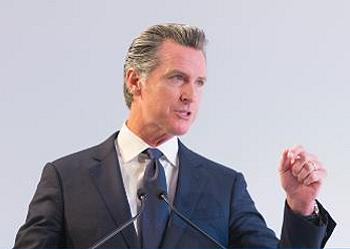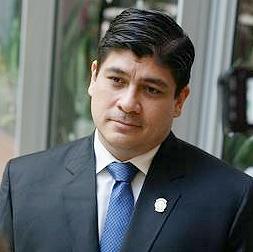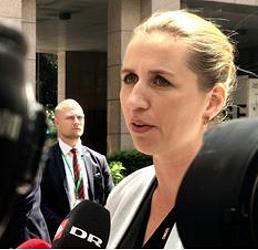
NEW YORK, New York, September 23, 2019 (ENS) – “California is significantly outperforming the United States of America in GDP growth over a five-year period – not despite our environmental strategies, but because of our environmental strategies,” California Governor Gavin Newsom told the opening day audience at Climate Week NYC, speaking to foreign dignitaries about how the state can be a model for the country and the world.
Ahead of Climate Week, Governor Newsom ordered the creation of a Climate Investment Framework to leverage the state’s US$700 billion CalPERS, CalSTRS and UC Retirement Program portfolio to drive investment toward carbon-neutral technologies.

Newsom also signed legislation strengthening the state’s emissions standards and establishing the nation’s first “smog check” for diesel trucks.
“As we change the way we produce and consume energy, it is spawning new companies, new energy, new growth. We lead in venture capital and green tech,” said Governor Newsom. “Five to one – five to one, the number of clean energy jobs in the State of California versus fossil fuel jobs. Which makes then the paradigm of this notion of alternative energy flip on its head. Alternative energy in the State of California is fossil fuel energy.”
Annually, the Climate Week NYC event attracts CEOs, government ministers, governors, mayors and investors from around the world who are shaping markets and setting policy to make climate action a reality. Climate Week NYC is run by The Climate Group, the international non-profit based in London and focused on accelerating climate action.
Later today, Governor Newsom spoke at the World Economic Forum Summit in New York about California’s climate leadership and joined a panel that included foreign dignitaries at the United Nations.
At each event, the governor said California refuses to wait for the Trump Administration to act. Illustrating that attitude, Newsom described the actions of his predecessor Governor Jerry Brown.
“Just five days after President [Donald] Trump announced his intention to pull out of the Paris Accord, Governor Brown pulled out of his driveway, made his way to the airport, flew to Beijing, sat down in the presidential palace with President Xi – not as a head of state, but a head of a state, the State of California – and doubled down on the Paris Accord. That’s California’s leadership. The fifth-largest economy in the world, a state that’s not just sitting back pointing fingers. We’re not bystanders, we have agency and we can shape this debate, like all of us, we can shape the future.”
A Democrat, Governor Newsom is facing active opposition from President Trump, a Republican.

Last Thursday, the U.S. Environmental Protection Agency released its One National Program rule, under which it revoked a Clean Air Act waiver issued to California that the state has used to set greenhouse gas emissions standards and establish a zero-emission vehicle program.
Since 1970, California has been able to set stronger emissions standards than those at the federal level because of the state’s dangerous levels of air pollution. Today, 13 states and the District of Columbia have adopted California’s standards, making up 35 percent of annual vehicle sales in the United States, and more could join down the line unless the Trump administration gets its way.
Governor Newsom said today that Trump is “attacking states’ rights.” He reminded the audience that the State of California for over half a century has had a federal waiver that goes back to Republican President Richard Nixon and former California Governor Ronald Reagan that established fuel efficiency and tailpipe emission standards, not only for our state but led to other states joining our protocols.
“The idea that he would even attack that goes to the core of conservative values, again, of states’ rights,” said Newsom.
California will fight the waiver revocation in court, Newsom promised.
“Mother Nature has joined the conversation,” the California governor declared. “This is not an intellectual exercise for us. A thousand miles of coast. You talk about sea-level rise – for every inch, we lose eight feet of our beach. You talk about two degrees Celsius – that’s 1,500 feet that we lose of our snowpack and our snowline. This is not an abstract issue.”
President Carlos Alvarado Quesada of Costa Rica, who has committed Costa Rica to be the first fully decarbonized country in the world, said at the opening ceremony, “Our house is on fire and our civilization is at risk. We must step up to ensure we avoid the worst of the climate catastrophe.”

“The science is clear, we have a short time to accelerate climate action and to shift our economies towards zero emissions in 2050,” he said. “We need to deliver concrete actions, programs, legislation, we need to deliver hope for our citizens, and for our children; we need to deliver hope for our planet.”
“We have a problem in the narrative,” President Alvarado said. “We keep talking about the science. … We start talking about this jargon that’s sometimes distant from the reality of the people. Narrative — it has to be about truth, based on science — but it needs to address the heart of the people, the inspiration of the people.”
Since he took office in May 2018, President Alvarado has set a goal for Costa Rica to achieve zero net emissions by the year 2050, and he is implementing measures to achieve this. Since 40 percent of the country’s greenhouse gas emissions come from transportation, he is focusing his efforts on that sector by building an electric rail-based public transit system for the capital, San José.
In February, President Alvarado launched a plan to fully decarbonize the country’s economy, in a ceremony alongside Christiana Figueres, the Costa Rican former head of the UN Framework Convention on Climate Change. At this event, he described decarbonization as “the great challenge of our generation,” and declared that “Costa Rica must be among the first countries to achieve it, if not the first.”
This plan targets the country’s electric grid to run on 100 percent renewable energy by the year 2030; make 70 percent of buses and taxis run with zero emissions by that same year, and 100 percent by 2050; and ensure that 60 percent of the country’s landmass is covered by rainforest by 2050.
At the Climate Week NYC opening ceremony, Denmark’s brand new Prime Minister Mette Frederiksen, at 41 Denmark’s youngest, pledged to work toward a 70 percent cut in her country’s carbon emissions by 2030.

“We’ll be one of the most ambitious parliaments in the world,” Frederiksen said of the environmental agenda of her new government. She said changes would likely include taxes on plastic and plans to increase forest cover in the Scandinavian nation.
Frederiksen said today that Danish pension firms have agreed to invest an additional 350 billion kroner into Denmark’s green transition over the next decade. This means that more than 10 percent of Danish pension firms’ funds will be invested in climate-friendly assets by 2030.
”The funds will be earmarked for everything from investment in wind energy parks and more energy-efficient buildings to companies that actively contribute to the green agenda,” Torben Möger Pedersen, the head of PensionDanmark, told TV2 News.
Prime Minister Frederiksen also announced that Denmark will donate 150 million kroner to the climate fund Global Climate Facility to help developing countries cope with the changing climate.
Climate Week NYC is being held this week to coincide with the UN Secretary-General’s Climate Action Summit taking place at UN Headquarters.
To dramatize the two big events, some of the best-known buildings across New York City went green the night of September 22. One World Trade, One Five One, One Bryant Park, the Javits Center, 30 Rock, The Weylin, Madison Square Garden, and Empire Outlets turned the famous New York City skyline green.
Big billboards high above Times Square played footage of the Amazon Rainforest to raise awareness of the role that nature plays in climate action acceleration.
This was a collaboration with the nonprofit environmental group The Nature Conservancy, which will be hosting over 100 events as part of Climate Week NYC to explore the role of nature-based solutions in tackling climate change.
This year, Climate Week NYC will double in size with over 350 events taking place across during the week, breaking last year’s record of 150. From film screenings, panel discussions, nature walks and theatre shows, New York is transforming itself into a thriving hub of climate action.
Helen Clarkson, CEO of The Climate Group, said, “As we saw with the climate strikes on Friday, citizens of New York are demanding action on climate like never before. “As governments and businesses gather together for the 11th Climate Week NYC, the biggest yet, we are challenging them to halve emissions by 2030 and rise to the scale of the challenge.”
New York Mayor Bill de Blasio told The Climate Group, “I want to thank everyone who is active in Climate Week – we need you. We’ve got to save this planet.”
Copyright Environment News Service (ENS) 2019. All rights reserved.
© 2019, Environment News Service. All rights reserved. Content may be quoted only with proper attribution and a direct link to the original article. Full reproduction is prohibited.
